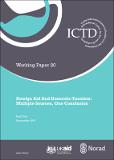| dc.contributor.author | Clist, Paul | |
| dc.date.accessioned | 2016-03-23T14:14:06Z | |
| dc.date.available | 2016-03-23T14:14:06Z | |
| dc.date.issued | 2014-09 | |
| dc.identifier.citation | Clist, P. (2014) Foreign Aid and Domestic Taxation: Multiple Sources, One Conclusion. ICTD Working Paper 20. Brighton: IDS. | en |
| dc.identifier.isbn | 978-1-78118-190-4 | |
| dc.identifier.uri | https://opendocs.ids.ac.uk/opendocs/handle/20.500.12413/10251 | |
| dc.description | development aid; tax; fiscal response; replication; MIMIC model. | en |
| dc.description.abstract | There are genuine concerns that foreign aid may crowd out domestic tax revenue. In the
short run this would have negative consequences for the recipient government's revenue,
and over a longer period could corrode governance through breaking the social contract. In
recent years, two papers have presented empirical results that suggest while aid loans are
free from such concerns, aid grants do crowd out tax revenue. Previous research showed
that the results from the first paper, Gupta et al. (2004), did not survive the inclusion of more
recent data or a minimal lag on aid variables (a simple way of reducing concerns of
endogeneity). This article deals with the second contribution, Benedek et al. (2012), and
finds that the results cannot be replicated. Furthermore, they suffer from serious problems
resulting from a dependent variable comprised of several incompatible data sources and
definitions. A variety of econometric techniques are used, including new data, with the weight
of evidence pointing to a modest but positive effect from foreign aid on domestic tax revenue.
Fears over a negative effect for aid grants appear unwarranted, and are accounted for by the
inappropriate use of data or endogeneity concerns. | en |
| dc.description.sponsorship | DfID, NORAD | en |
| dc.language.iso | en | en |
| dc.publisher | Institute of Development Studies | en |
| dc.relation.ispartofseries | ICTD Working Paper;20 | |
| dc.rights | Foreign Aid and Domestic Taxation: Multiple Sources, One Conclusion
Paul Clist
ICTD Working Paper 20
First published by the Institute of Development Studies in September 2014
© Institute of Development Studies 2014
ISBN: 978-1-78118-190-4
A catalogue record for this publication is available from the British Library.
All rights reserved. Reproduction, copy, transmission, or translation of any part of this publication may
be made only under the following conditions:
– with the prior permission of the publisher; or
- with a licence from the Copyright Licensing Agency Ltd., 90 Tottenham Court Road, London W1P 9HE, UK,
or from another national licensing agency; or
- under the terms set out below.
This publication is copyright, but may be reproduced by any method without fee for teaching or nonprofit purposes, but not for
resale. Formal permission is required for all such uses, but normally will be granted immediately. For copying in any other
circumstances, or for reuse in other publications, or for translation or adaptation, prior written permission must be obtained from
the publisher and a fee may be payable.
Available from:
The International Centre for Tax and Development
at the Institute of Development Studies,
Brighton BN1 9RE, UK
Tel: +44 (0) 1273 606261 Fax: +44 (0) 1273 621202
E-mail: info@ictd.ac.uk
Web: www.ictd/en/publications | en |
| dc.rights.uri | http://www.ids.ac.uk/files/dmfile/IDSOpenDocsStandardTermsOfUse.pdf | en |
| dc.subject | Economic Development | en |
| dc.title | Foreign Aid and Domestic Taxation: Multiple Sources, One Conclusion | en |
| dc.type | IDS Working Paper | en |
| dc.rights.holder | Institute of Development Studies | en |
| dc.identifier.externaluri | http://www.ictd.ac/ju-download/2-working-papers/13-foreign-aid-and-domestic-taxation-multiple-sources-one-conclusion | |

